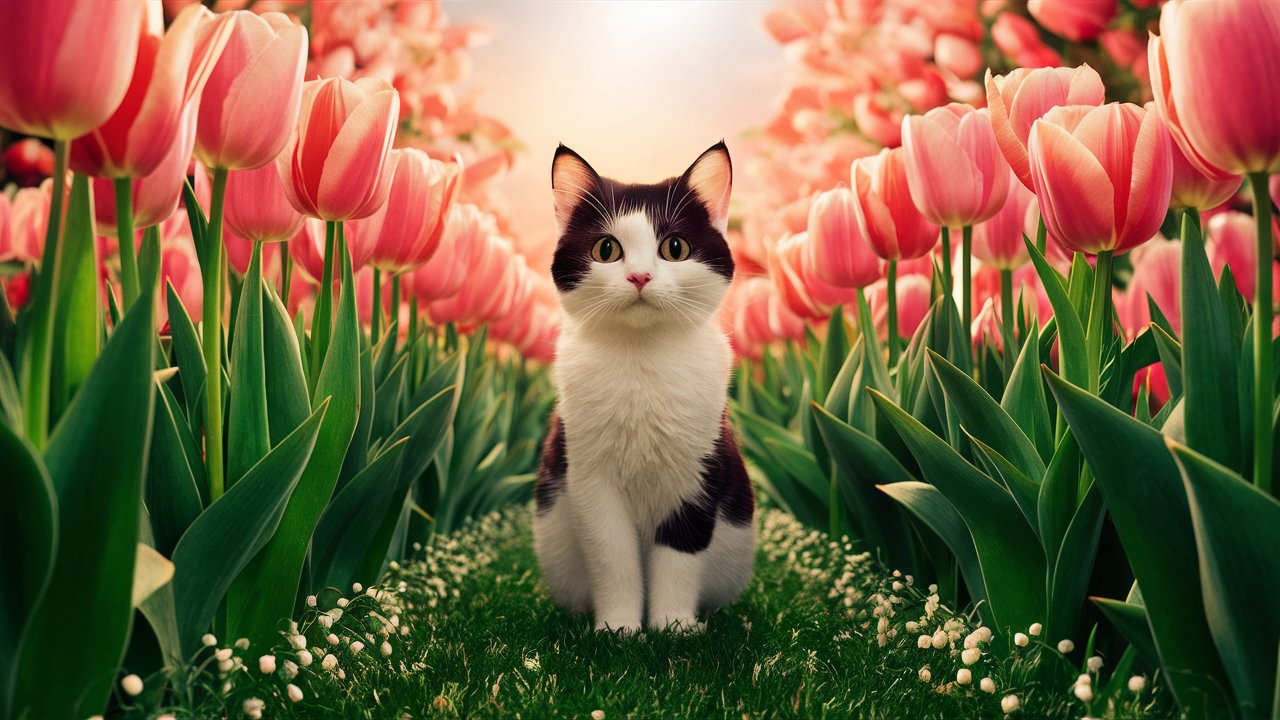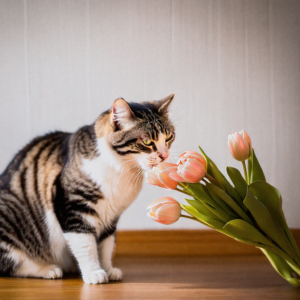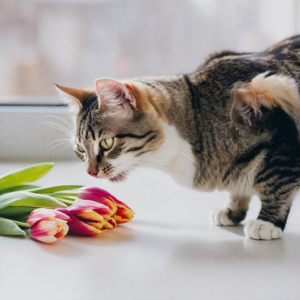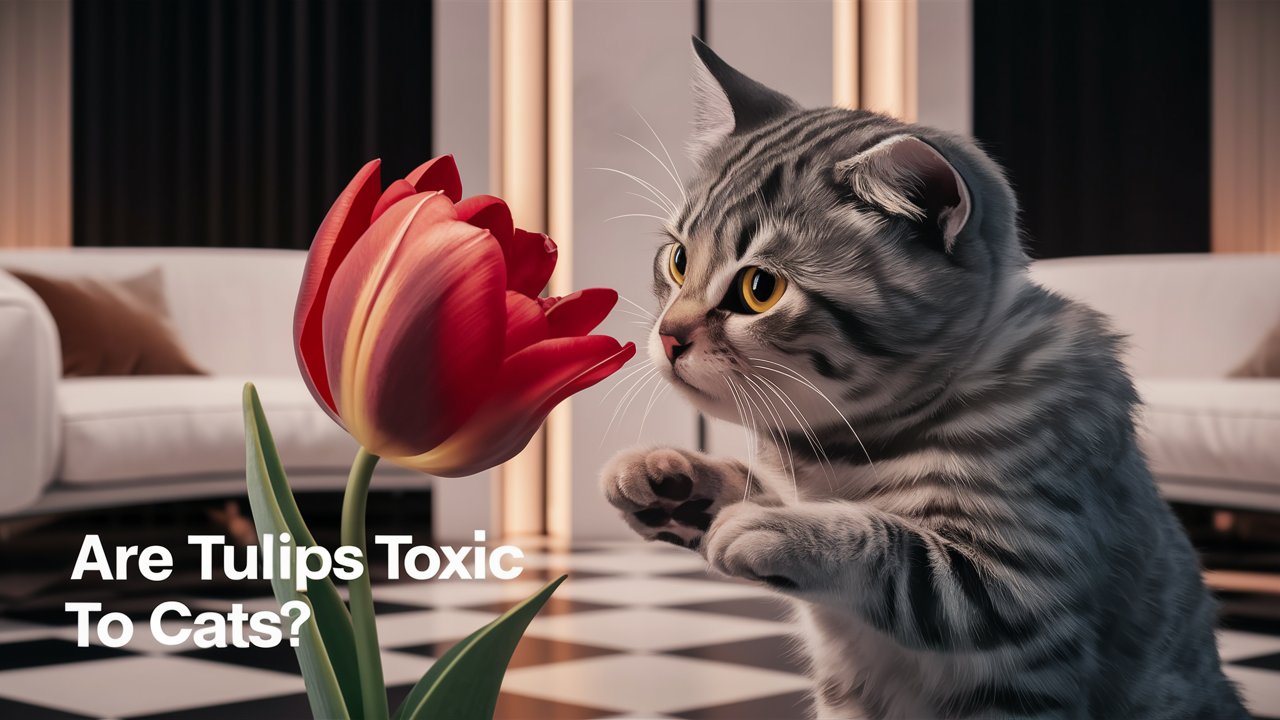
Are Tulips Toxic to Cats?
Tulips are beautiful flowers that many love to have in their gardens and homes. They come in many colors and are known for their bright, cheerful appearance. However, if you have a cat, you might wonder, “Are tulips toxic to cats?” This article will cover everything you need to know about tulips and their impact on cats, helping you ensure your furry friend’s safety.
Understanding Tulips and Their Appeal
Are tulips toxic to cats? – Tulips are flowers that bloom in the spring. They are part of the lily family and come in many colors like red, yellow, pink, and white. People love to plant them in gardens or use them in bouquets because they look so beautiful. But while they are lovely to look at, they can be dangerous to cats.
Varieties of Tulips
There are many kinds of tulips, from the classic ones to the more unusual types. Regardless of the type, are tulips toxic to cats? Yes, all tulips can be harmful to cats.
Are Tulips Toxic to Cats?
Yes, tulips are toxic to cats. The parts of the tulip that are harmful are called tulipalin A and tulipalin B. These are chemicals found in all parts of the tulip, but they are most concentrated in the bulbs. If a cat eats any part of a tulip, especially the bulb, it can make them very sick.
Cats and Their Curious Nature
Typical Cat Behavior
Cats love to explore and often use their mouths to investigate things. This curiosity can get them into trouble, especially with plants. Knowing that tulips are toxic to cats is important for keeping your pet safe.
Why Cats Are Drawn to Plants
Cats are often interested in plants because of their texture and sometimes their taste. So, are tulips toxic to cats if they decide to chew on them? Yes, they are.

Symptoms of Tulip Poisoning in Cats
If a cat eats any part of a tulip, they might show several signs of being poisoned. It’s important to know what these signs are so you can get help quickly. Symptoms of tulip poisoning are:
- Drooling: Your cat might drool a lot more than usual.
- Vomiting: Your cat may throw up frequently.
- Diarrhea: Your cat might have loose or watery stools.
- Lethargy: Your cat might seem very tired and not want to move around.
- Loss of appetite: Your cat may not want to eat.
- Depression: Your cat might seem sad or not interested in their surroundings.
- Tremors or seizures: In severe cases, your cat might have muscle tremors or seizures.
If you see any of these symptoms and think your cat might have eaten a tulip, call your vet right away.
Diagnosis of Tulip Poisoning in Cats
When you take your cat to the vet, they will need to diagnose if your cat has tulip poisoning. Here’s what they might do:
- Physical Exam: The vet will check your cat for symptoms like drooling, vomiting, and lethargy.
- History: The vet will ask you questions about your cat’s exposure to tulips and any plants they might have been around.
- Lab Tests: The vet might do blood and urine tests to see how much toxin is in your cat’s system and if there is any organ damage.
Diagnosing tulip poisoning quickly is important for getting the right treatment and helping your cat recover.
Treatment of Tulip Poisoning in Cats
If the vet finds that your cat has tulip poisoning, they will start treatment to help your cat feel better. Treatment might include:
- Inducing Vomiting: The vet might make your cat vomit to get rid of any remaining tulip pieces in the stomach.
- Activated Charcoal: This can help absorb the toxin and stop it from causing more harm.
- IV Fluids: Giving fluids through an IV can help keep your cat hydrated and support their kidneys.
- Medications: The vet might give your cat medicine to stop nausea and treat other symptoms.
The treatment will depend on how much tulip your cat ate and how severe their symptoms are.
Recovery of Tulip Poisoning in Cats
Most cats can fully recover from tulip poisoning if they get treated quickly. Recovery steps include:
- Follow-Up Visits: Take your cat back to the vet for check-ups to make sure they are recovering well.
- Supportive Care: Make sure your cat drinks plenty of water and eats regular meals.
- Monitoring: Keep an eye on your cat for any signs of ongoing or returning symptoms.
With good care and attention, your cat should be back to their normal self soon.
Preventing Tulip Poisoning in Cats
The best way to keep your cat safe from tulip poisoning is to prevent them from coming into contact with tulips. Here are some tips:
- Avoid Planting Tulips: If you have a cat, don’t plant tulips in your garden or keep them in your home. Choose cat-safe plants instead.
- Use Deterrents: Some pet-safe sprays and products can help keep your cat away from plants.
- Create a Safe Space: Have a specific area in your home or garden where your cat can play safely, without any toxic plants.
- Educate Your Family: Make sure everyone in your home knows that tulips are dangerous to cats so they can help keep the environment safe.

Safe Alternatives to Tulips
If you love flowers but want to keep your cat safe, here are some cat-friendly alternatives to tulips:
- Roses: These are non-toxic to cats and are a popular choice for gardens and bouquets.
- Orchids: These exotic flowers are safe for cats and can add a special touch to your home.
- Sunflowers: Bright and cheerful, sunflowers are a safe option for cat owners.
- Petunias: These colorful flowers are safe for cats and can be planted both indoors and outdoors.
Other Flowers and Plants to Keep Away From Your Cat
Besides tulips, other plants are also dangerous for cats. Here are some to avoid:
- Lilies: Very toxic and can cause kidney failure in cats.
- Azaleas: Can cause vomiting, diarrhea, and serious heart problems.
- Daffodils: Contain a toxin called lycorine, which can cause severe stomach problems.
- Oleander: Extremely poisonous and can cause severe heart issues.
Always check if a plant is safe before bringing it into your home or garden.
Safe Plants for Homes with Cats
Non-Toxic Plant Options
Many plants are safe for cats, like spider plants, Boston ferns, and African violets. These won’t harm your cat like tulips, which are toxic to cats.
Creating a Cat-Friendly Green Space
Make a special area for your cat with safe plants they can enjoy. This way, they can explore without risk. Always keep in mind that tulips are toxic to cats.

What to Do if Your Cat Eats Tulips
If you think your cat has eaten tulips, act fast. Here’s what to do:
Remove Access:
Take away any remaining parts of the tulip from your cat.
Contact Your Vet:
Contact your vet or an emergency clinic immediately. Tell them how much and what part of the tulip your cat ate.
Follow Veterinary Advice:
The vet might tell you to bring your cat in for treatment. Follow their instructions carefully.
Monitor Your Cat:
Watch your cat closely for any signs of distress and follow any care instructions from the vet.
When to See a Vet
If your cat shows severe symptoms like trouble breathing or seizures, go to the vet. This urgency is necessary since tulips are toxic to cats.
Long-Term Effects of Tulip Poisoning
Educating Yourself and Others
Are tulips toxic to cats? – Knowing about the dangers of tulips and other toxic plants is essential for keeping your cat safe. Share this information with friends and family who have cats to help prevent accidental poisonings. The more people who know about these risks, the safer our cats will be.

Balancing Aesthetic and Safety
Designing a Beautiful and Safe Home
You can have a beautiful home and keep your cat safe. Use fake plants or put real ones in places your cat can’t get to. This is vital since tulips are toxic to cats.
Plant Displays and Arrangements
Use shelves, terrariums, and hanging planters to keep plants away from your cat. This way, you can still enjoy plants without risking your cat’s health. Remember, tulips are toxic to cats.
Real-Life Stories
Experiences of Other Cat Owners
Many cat owners have figured out how to keep both their plants and pets. These stories can give you helpful tips. They often highlight the fact that tulips are toxic to cats.
Lessons Learned
Learning from others can help you avoid mistakes and keep your cat safe. One important lesson is knowing that tulips are toxic to cats.
Expert Opinions
Veterinarian Insights
Vets can give you good advice on keeping your cat safe from harmful plants. They often remind us that tulips are toxic to cats.
Plant Specialist Recommendations
Plant experts can suggest safe plants and help you create a cat-friendly home. They will usually advise against tulips because they are toxic to cats.

Final Thoughts: Are Tulips Toxic to Cats?

I am a dedicated writer and expert in cats, with years of experience studying feline behavior, health, and breeds. Passionate about sharing my knowledge, I provide valuable insights and practical advice to help cat lovers understand and care for their furry companions. When not writing, I enjoy spending time with my beloved cats, continually learning and deepening my expertise.

Leave a Reply